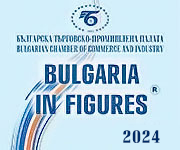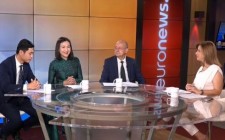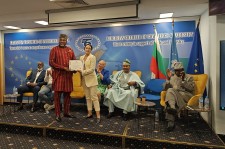Ethical Rules of Conduct for Arbitrators

PREABMBLE
The present Ethical Rules of conduct for arbitrators (“Ethical rules”) shall apply to all arbitrators of the Court of Arbitration at the Bulgarian Chamber of Commerce and Industry (“AC at the BCCI”). These Rules are intended to encourage the professionalism and quality of work of arbitrators; to reaffirm the justice and impartiality of the arbitration procedure; to raise the public trust in the arbitration method for solving disputes as well as in the AC at the BCCI as the leading arbitration institution in the Republic of Bulgaria. The Ethical rules aim at establishing equitable and appropriate conduct for arbitrators during the process of hearing and solving of arbitration cases; they establish standards for their social and personal behaviour and by creating a framework for the expectations of those parties who have turned to the AC at the BCCI for the protection of their rights.
|
SECTION I Principle Provisions |
||
| Art. 1. | (1) | During the course of their activities, arbitrators shall be independent and shall be obliged to act in honesty and to remain impartial by solely submitting to the Constitution, the international treaties to which the Republic of Bulgaria is signatory, the laws and norms of justice. |
| (2) | Arbitrators shall be bound by the rules of conduct in their professional activities, in executing their public deeds and in their personal life. | |
| (3) | It shall not be admissible for an arbitrator to have any personal interest in the outcome of those cases that have been heard and solved by a tribunal to which that arbitrator is a member. | |
| Art. 2. | In order to avoid any doubts with regard to the presence of independence and impartiality of arbitrators, resp. the lack of interest in the outcome of the case, the following shall not be permitted: | |
|
||
|
SECTION II Rules of Professional Conduct for Arbitrators |
||
| Art. 3. | (1) | Upon their election or appointment arbitrators must disclose all the circumstances which as a result of an objective judgment could evoke doubts in relation to the arbitrator’s independence and impartiality. |
| (2) | Arbitrators shall also have the obligation pursuant to the preceding paragraph in situations where the circumstances, that may give rise to doubts concerning their independence and impartiality have occurred after their election/appointment as arbitrators. | |
| (3) | Upon the acceptance of their mandate and at any subsequent rise of doubts concerning their independence and impartiality, arbitrators shall fill out a declaration of independence and impartiality, which shall be brought to the attention of the parties to the proceeding. | |
| (4) | The breach of the obligations listed under this Article shall qualify as a breach of the Ethical Rules, even when the failure to declare the circumstances does not substantiate a challenge of an arbitrator. | |
| Art. 4. | Arbitrators shall accept the parties’ choice or their official appointment only if they are certain that they meet the following requirements and the following conditions are present: | |
|
||
| Art. 5. | (1) | During the course of the arbitration proceedings, arbitrators shall be obliged to treat the opposing parties as equal and shall display equal treatment to all the parties to the case. Consequently arbitrators shall refrain from acting or speaking in a manner that might give rise to doubts concerning their independence and impartiality. |
| (2) | Arbitrators shall therefore be patient and shall relate to the parties, their legal representatives, to the witnesses and to other participants in the proceeding kindly and with due respect. | |
| (3) | During the hearing of the case and before the enactment of a ruling with which the case is terminated, arbitrators shall refrain from any kind of contact with the parties to the proceeding or with their legal representatives, which might give rise to a reasonable doubt concerning their independence and impartiality. | |
| (4) | Arbitrators shall owe to their colleagues- arbitrators, secretaries and other officials of the AC at the BCCI- understanding and respect, and shall be bound to refrain form any unprincipled critiques and inappropriate personal evaluations. | |
| (5) | Arbitrators shall therefore fulfill their official duties in good faith, by endavouring what is necessary for the adherence to the principles for expediency of the arbitration procedure. | |
| Art. 6. | It is inadmissible for arbitrators to accept (directly or indirectly) any benefits through (gifts, favours, hospitality, engagement in other legal proceedings, employment, favours or consultations for their relatives and any similar) from a party to the proceeding, their legal representatives and including third parties. | |
| Art. 7. | Arbitrators shall not be influenced by any kind of exterior pressure, fear of criticism or another type of interest or frustration during the formation of opinion on the issues raised during the proceedings or in act of rendering of the final award. | |
| Art. 8. | (1) | Arbitrators shall be obliged not to share and spread any information by any kind of means, that they have become aware of during the hearing and solving of a case and to keep the trade secrets of the parties. |
| (2) | Arbitrators shall be obliged to keep secret the discussions of the members of the Arbitral Tribunal on any issues related to the proceeding in question. | |
| Art. 9. | Except when otherwise prescribed by law, it shall be strictly forbidden for arbitrators that are named in the lists of the AC at the BCCI, to participate in arbitration proceedings that involve the challenge of arbitrators or aimed at setting aside of arbitral awards issued by the AC at the BCCI. Any opinions or consultations concerning such issues, related to such proceedings shall not be permissible. | |
| Art. 10. |
It shall not be permissible for arbitrators included in the lists of the AC at the BCCI to be employed as arbitrators by other institutional arbitration with general jurisdiction on the territory of the Republic of Bulgaria.
|
|
|
SECTION III Rules of Personal Conduct for Arbitrators |
||
| Art. 11. | The arbitrators’ personal appearance is a part of the public’s perception of the arbitration institution, therefor arbitrators: | |
|
||
|
SECTION IV Rules of Conduct in the Public Arena |
||
| Art. 12. | Arbitrators may assist in the improvement of the law and the legal order and in the environment in the Republic of Bulgaria by expressing opinions and participating in discussions related to legislative changes; give lectures, publish generally popular and academic work, take part in radio and television shows and others, observing the present rules. | |
| Art. 13. | In their relations with public authorities and institutions, with non-governmental organisation and the media, arbitrators shall: | |
|
||
| Art. 14. | A breach of the present Rules (according to the weight of a particular infringement) may lead to the removal of the arbitrator form the lists at the AC at the BCCI. | |
The present Ethical Rules were enacted with a ruling by the General Assembly of the arbitral colleagues on 23rd February 2005.
12.05.2005

 1 USD =
1 USD =  1 GBP =
1 GBP =  1 CHF =
1 CHF =  ISO 9001:2015
ISO 9001:2015


